Want to know how to start a BPO company?
With tons of businesses looking to outsource their non-core activities, starting a BPO company has never been more lucrative!
In this article, we’ll show you how to start a BPO company and run it effectively.
Table of Contents

What is Business Process Outsourcing (BPO)?
Business process outsourcing is an activity where a company contracts its non-core work to an external party. Traditionally, most companies outsource the work to dedicated BPO firms.
For example, many companies in the United States outsource their customer support to small BPO companies in India.
However, with the rise of the gig economy, companies now also hire freelancers to do the job for them.
Why do companies do this?
Outsourcing non-core business activities like data entry and customer service let companies focus solely on their core business operations. This way, they can only invest resources in tasks that matter the most.
What’s in it for you as a BPO vendor?
The BPO industry just keeps growing. As tons of companies are looking to outsource their non-core activities, there are plenty of business opportunities in the BPO industry for new BPO providers.
By setting up BPO firms like domestic call centers in countries like the Philippines and India, you’re also going to save tons of money.
How?
You’ll incur:
- Reduced setup costs.
- Cheaper overheads.
- Lower salaries.
Plus, there’s no shortage of services that businesses are willing to outsource!
This means that you can start a BPO business that specializes in pretty much anything, such as:
- Inbound or outbound call center services.
- Market research.
- Data entry.
- Human resource management.
- Payments or claims processing.
- Customer support and other back-office services.
- Digital marketing and e-commerce.
The six steps to start a BPO business
Here’s how you can start and run a business process outsourcing company in six simple steps:
1. Determine the type of BPO you want
The first step in setting up a BPO company is identifying your business niche.
Why?
Zeroing in on a niche helps you determine:
- Your BPO industry sector.
- The activities your BPO firm undertakes.
- The type of clients you engage with.
For example, you could provide call center services to small companies in the retail industry. Here, your BPO sector is retail, your activities are call center services and the type of clients you work with are small companies.
Remember, when starting out, select an outsourcing service you’re familiar with. For example, if you have no experience handling administrative work, don’t offer those services. Even though it may seem straightforward, you’re better suited to offering services you’re already trained in.
Once your company has gained enough traction, you could choose to expand your business in one of two ways:
1. Horizontal BPO
Refers to BPO activities that can be offered across multiple industries. For example, you could only provide technical support across various industries like IT, financial, retail and marketing. In this scenario, your service remains unchanged; however, the industry focus of your business varies.
2. Vertical BPO
Refers to BPO services that are industry-specific. For example, medical coding and billing are activities that are specific to the healthcare industry. Here, your industry focus remains the same while your offerings expand to include other activities within that industry.
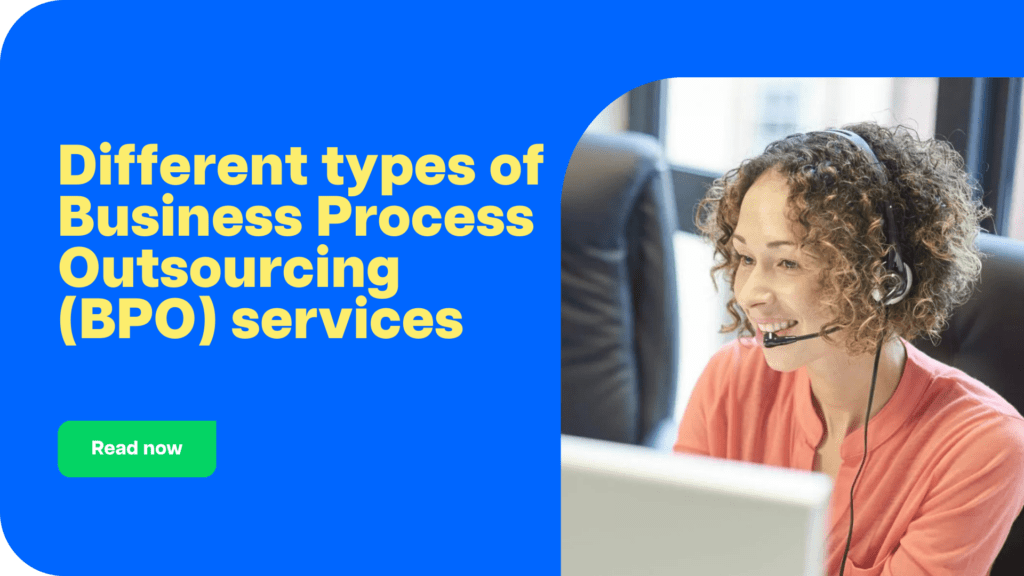
2. Develop a new business plan
The next step is developing a business plan for your company.
Ideally, your plan must be well-researched and comprehensive. You need to analyze the intricacies of your chosen niche and look at what your competitors are doing.
Your business plan should:
- Determine your company’s long-term direction.
- Set clear business budgets, objectives and milestones.
- Identify your business structure.
- Help lenders and investors understand your business idea.
While it’s important to develop a good plan, you need to review and update it regularly. This ensures that you’re always able to adapt to any new changes in the market.

3. Do the paperwork
Once your business plan is ready, you’ll have to handle all the necessary paperwork involved in setting up a company.
As this varies on a country-by-country basis, you’ll need to find out how the process works in your country.
For example, if you’re looking to start your BPO business in Bangalore, Chennai or anywhere else in India, here’s how you can register your business:
- In India, you need to register your business under the Companies Act 2013. This law regulates the responsibilities and operations of firms in the country. You also need to register with the National Association of Software and Services Companies (NASSCOM) to be certified as a BPO provider in India.
- If you are a call center or offer telemarketing and other IT services in India, your business must be listed as a Private Limited Company. You also need to obtain the Other Service Provider (OSP) license from the Department of Telecommunications (DOT).
- Once you’ve received the OSP license, you may also need to register your business under the Goods and Services Tax (GST), depending on your BPO offerings.
Laws and tax regulations are always complicated and confusing, so why not consult a legal expert to help you out?
They can easily break down the complexities of your registration process and identify laws that may be beneficial for your business.
4. Invest in the necessary equipment and technology
Regardless of the kind of services you offer, you’ll need to invest in some essential equipment and technology.
For example, most BPO companies need resources such as:
- Office space and furniture.
- Computers and office supplies.
- A high-speed internet connection.
- Workforce management tools.
Some BPO firms such as call centres will also need specialized equipment such as headsets and recording systems.
Remember, the equipment you need will vary based on the type of business process outsourcing service you’re offering. So go over what you need and only invest in that software.
Most companies spend tons of money on tools they don’t need!
With that being said, here are a few key tools that every BPO firm should have:
A. Communication tools
You’ll need a set of good communication tools to keep your projects running smoothly. These tools will help your team collaborate over projects and share updates and relevant files.
Messaging tools
Messaging tools like Fleep and Slack help you quickly collaborate over projects and share relevant data with your staff. You can even create individual channels for team-specific conversations. For example, you can create a sales message channel for focused discussions with your sales team.
Video conferencing tools
Video calling tools like Skype and Zoom help you easily interact with your BPO staff. You can host team meetings and product reviews even if your BPO staff is spread across the globe! It’s an excellent way to build team chemistry and ensure that everyone in your BPO team feels connected.
B. Performance tracking tools
Performance tracking tools help you monitor the productivity of your employees.
Most companies use them to:
- Determine how active their employees are while working.
- Identify if someone’s passing idle-time as work hours.
- Track how long projects take to complete. Create accurate records of time worked to bill clients.
With tools like Time Doctor, you get all this and more!
What’s Time Doctor?
Time Doctor is a powerful time tracking and productivity monitoring software.
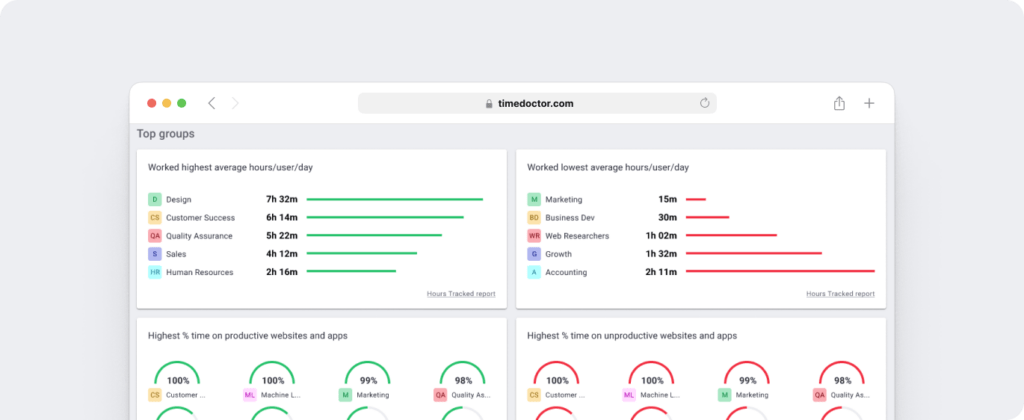
It lets you:
- Track time an employee spends on each task.
- Monitor their web and app activity during work hours.
- Identify poor-time usage to hold the employee accountable.
- Ensure that your staff is actively working.
- Access tons of accurate reports for client billing.
Here’s a closer look at how Time Doctor helps you monitor your BPO employees:
1. Simple time tracking
Most time tracking tools can be confusing to use.
This is an issue because when your staff is wasting time figuring out how to use a tool, they’ll have less time to work on their tasks!
Luckily, TimeDoctor is super easy to use.
The tool lets you track time in four simple steps:
- Open Time Doctor.
- Enter the task or project name.
- Start the timer (the app then starts tracking time quietly in the background).
- Stop the timer when you’re done with your task.
As you won’t have to train your employees to use Time Doctor, they can get started right away!
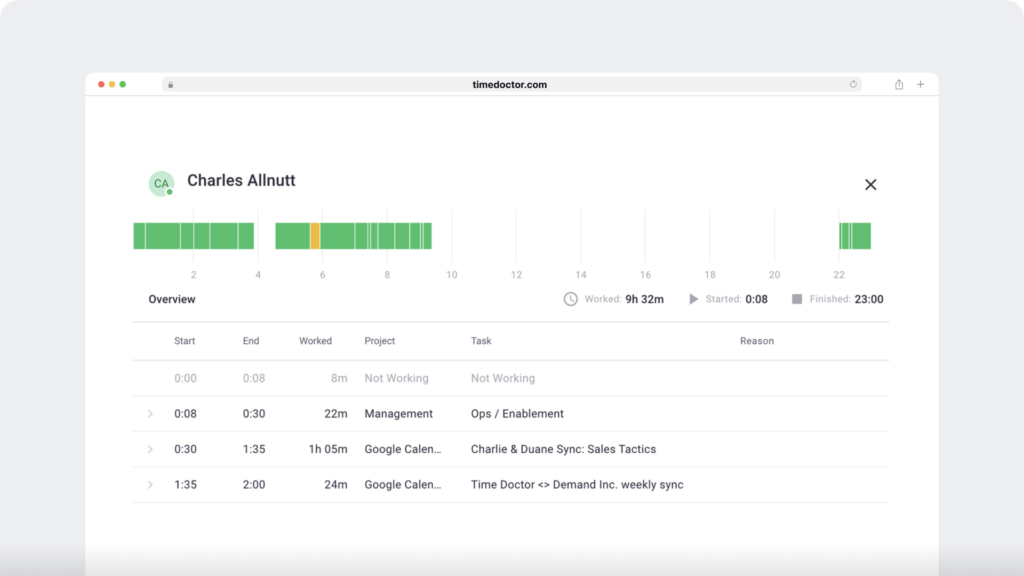
2. Powerful and accurate project records
Time Doctor’s Project Reports give you a detailed break down of the hours spent on each project. It shows you who worked on each task and for how long. For example, if you’re a call center, you’ll know which employee spent the most time answering customer calls.
As the reports are accurate to the second, you can even use it to bill your clients on an hourly basis.
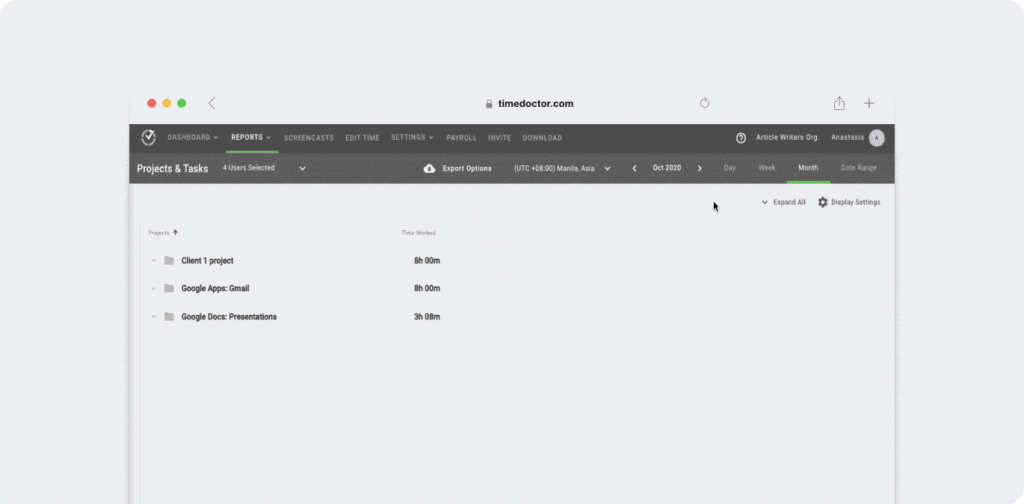
What’s more?
Time Doctor generates tons of other detailed reports, such as:
- Timesheet report – shows the total hours worked by all your BPO staff over a given period.
- Time use report – displays the time spent on tasks by each employee over a specific period.
- Timeline report – displays each employee’s daily work activity in chronological order.
- Attendance and late report – shows who was absent or late on each day and their reason for it.
You can click here for more information on Time Doctor’s reports.
3. Keep your team focused on their tasks
You can’t have your employees get distracted while they’re working, right?
Luckily, Time Doctor has a web and app activity tracker.
The tool automatically monitors your employee’s web and app usage during work hours. If someone accesses an unproductive website like Facebook or YouTube, Time Doctor displays a pop-up asking them if they’re still working. This nudge is enough to get them back to work.
For added flexibility, you can customize which websites and apps are categorized as unproductive.
Time Doctor also gives you a Web and App Usage Report that shows which websites and apps were used by each employee and for how long.
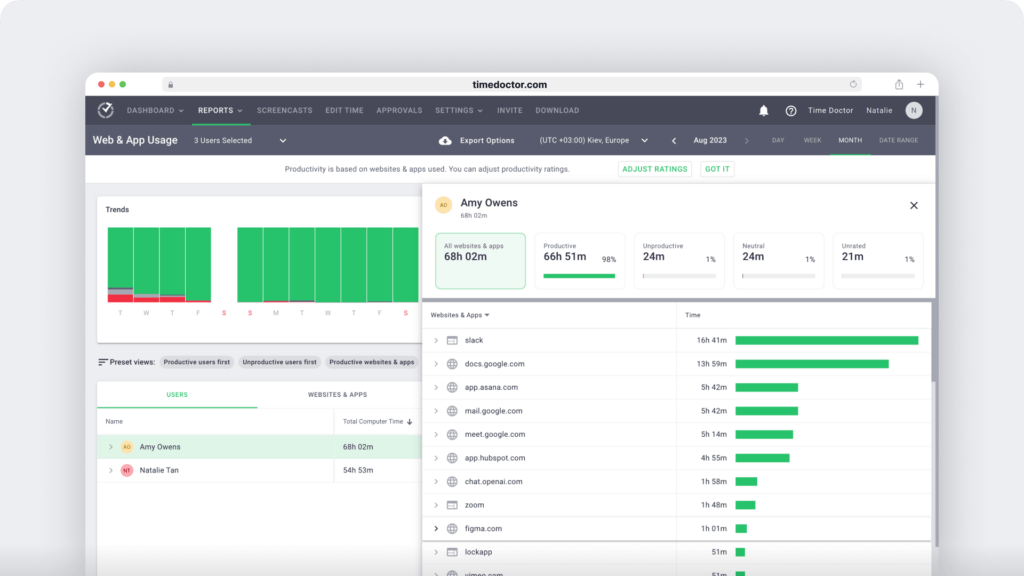
4. Seamlessly integrate with your other workplace software
Time Doctor instantly integrates with tons of different workplace software to help you track the time spent on those tools. You can connect it to your project management, team communication and payment tools for added functionality.
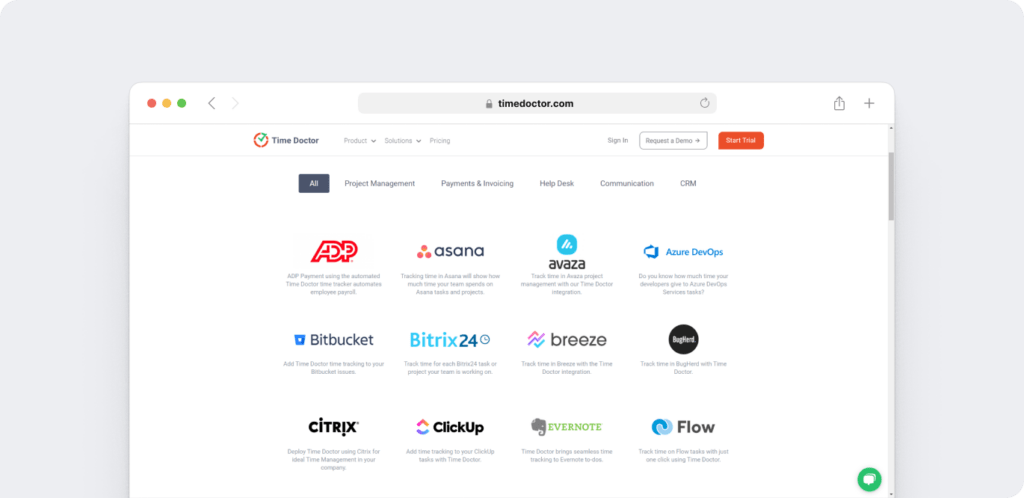
Click here for the complete list of Time Doctor’s integrations.
5. Staff your BPO firm
You’ll now have to staff your own business process outsourcing company.
A. Determine your requirements
Since you’re only starting out, it’s safer to hire around 15-20 experienced people on a full-time basis. As they’re experienced, they won’t require much training in the new job and can help you scale up quickly. Once you grow, you can start to expand and hire more people.
However, this isn’t a hard-and-fast rule.
The number of people you hire and your hiring criteria will vary based on your BPO specialty.
For example, when staffing an on-site call center, you may need to hire at least 50-100 people. However, if you’re opting for a remote-based call center, you’ll need a 25 seater BPO.
When hiring call center agents, your chief evaluation criteria must be communication skills. You’ll need to hire people who are fluent in your chosen language, can communicate effectively and empathize with customers.
B. Finding candidates
Finding the right candidates is never an easy task.
However, when you have a clear idea of the number of people you need and the type of people you’re looking for, this becomes easier.
Create a detailed job description that outlines:
- The activities they’re expected to perform.
- The qualifications needed.
- The skills required for the job.
- What your company is about.
- How this job can help them.
Outlining all of that is essential as it’ll give the candidate a clear idea of what they can expect from the job. This will help narrow your selection pool to include only the most committed candidates who fulfill all your requirements.
Post this job description on sites such as LinkedIn or AngelList to get the applications rolling in! Alternatively, you can hire a part-time hiring manager to find candidates for you in case you need to staff up quickly.
Once you have a set of reliable employees, you can create a referral program where they recommend talent from their networks to join your BPO firm. This is another good staffing option as your employees understand your company culture and will only recommend candidates who are a good fit.
6. Marketing your business and getting clients
Now that your business is up and running, you need to market it to gain more clients.
A. Build a top-notch website for your company
Start by building a user-friendly website for your company. Hire professional copywriters and web designers to create your site.
The benefits?
- A user-friendly website helps you build brand credibility and improve the search engine discoverability of your business.
- Your website clearly describes who you are and what you do—helping you inform leads of your services.
- It makes it easy for people to contact you if they need your services.
Important Tip
When getting a domain name for your business, avoid .net domains if you can. Always try and get a .com domain as that’s usually the go-to extension that people use when searching Google.
If you opt for a .net domain, someone might type your company’s name, follow it with .com and be directed to a competitor’s site!
B. Networking
Using your current network to find clients is your best bet when you’re starting out as a small business. As these people already know you, they’ll be more than willing to give your BPO firm a shot. You can even ask them to recommend you to their connections to build your name in the BPO industry.
C. Spreading awareness
Traditionally, BPOs relied completely on sales teams for leads, since they were targeting enterprise clients only. However, with the scope of BPO expanding to mid-size and small businesses too, you can also opt for several different marketing strategies such as:
- Using social media to spread awareness and find clients.
- Using SEO and content marketing to get found on search engines.
- Using paid ads on LinkedIn and Google.
Conclusion
Starting your own BPO company isn’t rocket science.
You need to analyze the BPO industry in your niche, outline a strong business plan, complete the necessary paperwork and invest in the right tools to run your business. Once you’ve done that, you’ll have no trouble running your BPO firm and growing it in no time!

Andy is a technology & marketing leader who has delivered award-winning and world-first experiences.


